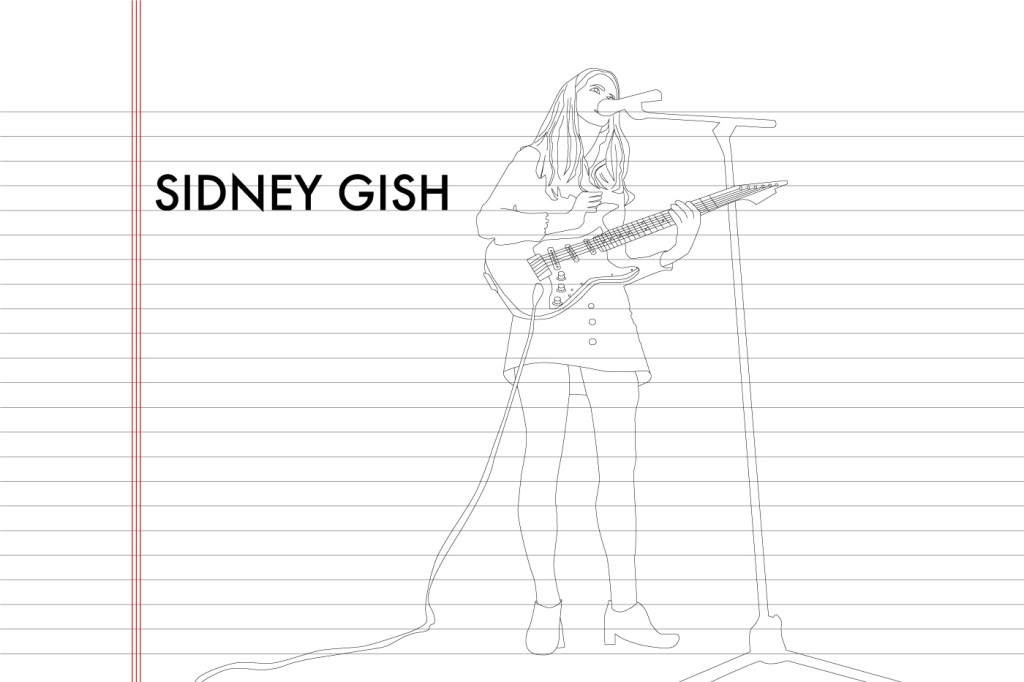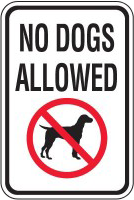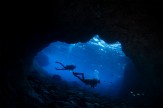Student musician is NPR’s artist to watch

Sidney Gish
Student-musician is NPR’s artist to watch
Written by Danny Hajjar. Design and development by YoungHee Jang & Hannah Moore
When you’re on Spotify’s “New Music Friday” playlist, you know you’ve made it.
That’s what happened to Sidney Gish, a third-year student at Northeastern, soon after she released her latest album No Dogs Allowed. The album received a glowing review in Pitchfork and grabbed the attention of NPR, which named Gish, AMD’20, one of its 2018 Slingshot Artists to Watch.
We spoke with Gish, who is currently on co-op at Island Records in New York City, about her album, her songwriting process, and some of her favorite artists.
![]()
You’ve been gaining a lot of national attention since releasing your latest album. What’s it been like?
At my current co-op, we report on Spotify’s “New Music Friday” playlist each week, and I was on it the week before I started my co-op. And my boss was like, “Whoa, you’re on this playlist!” So that was a cool moment. It’s been really cool to be in the national spotlight.
![]()
Speaking of your latest album, why did you call it No Dogs Allowed?
Even though I like dogs, I just like the name No Dogs Allowed. I like the way the title sounded. Whenever I have an idea, I’ll just write it down in my notes, even if it doesn’t apply to anything I’m actually working on. So, I was thinking that “no dogs allowed” is pretty straightforward, and I wanted to mess around with the idea of a “no dogs allowed” sign on the cover.
![]()
Your lyrics seem to focus on things people can relate to. Is that intentional? How do you approach songwriting?
I usually write melodies first and then put lyrics to them. Usually if I have a melody, I’ll have a placeholder lyric that doesn’t really mean anything or make any sense. Sometimes I’ll keep it if it kind of makes sense, like in the song “Not but for you, Bunny.” And then if I have another lyrical idea that I want to flesh out a little bit more, sometimes I’ll write a long paragraph and take words from that and try to and make them fit a melody that I’ve written. Sometimes I’ll sit and write couplets that are perfectly spaced out, but then if I sing them to a melody they’re really boring. I have a bunch of random couplets that I don’t know what to do with yet. I just kind of write whenever I think of anything. And I’ll go through my notes to see what I’ve already written and if it’ll fit into the song I’m trying to make. I finished my first couple songs I ever wrote in seventh grade and they were really spazzy. Mainly 12-year-old me being mad at “popular girls” for dumb reasons.
Student-musician is NPR’s artist to watch
Written by Danny Hajjar. Design and development by YoungHee Jang & Hannah Moore
When you’re on Spotify’s “New Music Friday” playlist, you know you’ve made it.
That’s what happened to Sidney Gish, a third-year student at Northeastern, soon after she released her latest album No Dogs Allowed. The album received a glowing review in Pitchfork and grabbed the attention of NPR, which named Gish, AMD’20, one of its 2018 Slingshot Artists to Watch.
We spoke with Gish, who is currently on co-op at Island Records in New York City, about her album, her songwriting process, and some of her favorite artists.
![]()
You’ve been gaining a lot of national attention since releasing your latest album. What’s it been like?
At my current co-op, we report on Spotify’s “New Music Friday” playlist each week, and I was on it the week before I started my co-op. And my boss was like, “Whoa, you’re on this playlist!” So that was a cool moment. It’s been really cool to be in the national spotlight.
![]()
Speaking of your latest album, why did you call it No Dogs Allowed?
Even though I like dogs, I just like the name No Dogs Allowed. I like the way the title sounded. Whenever I have an idea, I’ll just write it down in my notes, even if it doesn’t apply to anything I’m actually working on. So I was thinking that “no dogs allowed” is pretty straightforward, and I wanted to mess around with the idea of a “no dogs allowed” sign on the cover.
![]()
Your lyrics seem to focus on things people can relate to. Is that intentional? How do you approach songwriting?
I usually write melodies first and then put lyrics to them. Usually if I have a melody, I’ll have a placeholder lyric that doesn’t really mean anything or make any sense. Sometimes I’ll keep it if it kind of makes sense, like in the song “Not but for you, Bunny.” And then if I have another lyrical idea that I want to flesh out a little bit more, sometimes I’ll write a long paragraph and take words from that and try to make them fit a melody that I’ve written. Sometimes I’ll sit and write couplets that are perfectly spaced out, but then if I sing them to a melody they’re really boring. I have a bunch of random couplets that I don’t know what to do with yet. I just kind of write whenever I think of anything. And I’ll go through my notes to see what I’ve already written and if it’ll fit into the song I’m trying to make. I finished my first couple songs I ever wrote in seventh grade and they were really spazzy. Mainly 12-year-old me being mad at “popular girls” for dumb reasons.

Listen to Sidney’s album on Spotify
![]()
Do you have any favorite songs from your album?
I’m really happy that I recorded “Sin Triangle.” I’ve been performing that song for a long time, and I think the recording came out really well. My favorite melody is the chorus on “Imposter Syndrome.”
![]()
What artists or bands do you listen to or draw influence from?
The Avalanches and Of Montreal are two of my favorite artists. The Avalanches make really full music, using samples that tell a story and have a melody. Of Montreal is just off the wall when it comes to writing. I haven’t even listened to all of their albums because Kevin, the lead, puts out one album every two seconds and I can’t keep up with it. Every time I decide to listen to one album, I think it’s so good but also overwhelming because they pack so much material into so little time. It’s inspiring but it also freaks me out.
I recently started listening to Katie Dey. She makes pop music that sounds like you woke up from a dream and tried to remember the music you heard in your dream. Her song “Unkillable’ is so good.
![]()
Do you have any favorite songs from your album?
I’m really happy that I recorded “Sin Triangle.” I’ve been performing that song for a long time, and I think the recording came out really well. My favorite melody is the chorus on “Imposter Syndrome.”
![]()
What artists or bands do you listen to or draw influence from?
The Avalanches and Of Montreal are two of my favorite artists. The Avalanches make really full music, using samples that tell a story and have a melody. Of Montreal is just off the wall when it comes to writing. I haven’t even listened to all of their albums because Kevin, the lead, puts out one album every two seconds and I can’t keep up with it. Every time I decide to listen to one album, I think it’s so good but also overwhelming because they pack so much material into so little time. It’s inspiring but it also freaks me out.
I recently started listening to Katie Dey. She makes pop music that sounds like you woke up from a dream and tried to remember the music you heard in your dream. Her song “Unkillable’ is so good.

Listen to Sidney’s album on Spotify
![]()
You mentioned that you finished your first couple songs in seventh grade. So how has Northeastern helped you advance your songwriting and career?
The music industry program has helped me understand how to be my own manager. I also just finished my recording minor, and that helps a lot in terms of learning the basics of mastering and mixing.
I’m on co-op right now doing A&R at Island Records in New York, which I’m excited about. It’s completely different from writing my own music, so it’s cool to see two different sides of the same coin. Getting experience with what I’m doing on co-op is important if I eventually want to be a songwriter. The whole “working with artists” side of the industry—whether it’s managing your own material or helping artists work with a label or write their songs—it’s all tied together. I’m glad I get to do this all at once.
![]()
You mentioned that you finished your first couple songs in seventh grade. So how has Northeastern helped you advance your songwriting and career?
The music industry program has helped me understand how to be my own manager. I also just finished my recording minor, and that helps a lot in terms of learning the basics of mastering and mixing.
I’m on co-op right now doing A&R at Island Records in New York, which I’m excited about. It’s completely different from writing my own music, so it’s cool to see two different sides of the same coin. Getting experience with what I’m doing on co-op is important if I eventually want to be a songwriter. The whole “working with artists” side of the industry—whether it’s managing your own material or helping artists work with a label or write their songs—it’s all tied together. I’m glad I get to do this all at once.





